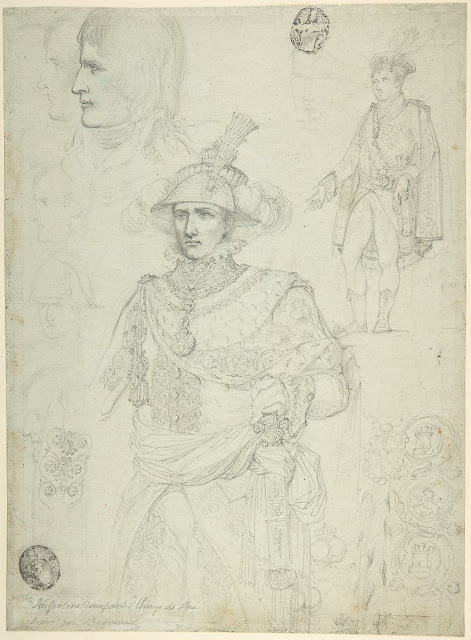 |
| Napóleon a Mars-mezőn. Jean Démosthène Dugourc rajza. Napoléon on the Champ de Mars. Sketch made by Jean Démosthène Dugourc. Napoléon am Marsfeld. Skizze von Jean Démosthène Dugourc. Napoléon pe Champ de Mars. Schiță realizată de Jean Démosthène Dugourc. (kb./ca. 1815) Source of the photo: https://bit.ly/2Anj8E0 |
(HU) 1815. június 1-én ‒ közvetlenül egy ezen kérdésre vonatkozó népszavazás után ‒ I. Napóleon francia császár ünnepélyes keretek között, a párizsi Mars-mezőn (7. kerület, ma az Eiffel-torony is ebben a parkban található) letette az esküt az új francia alkotmányra.
A március 20-án Párizsba bevonult császár április 22-én írta alá a francia alkotmányt kiegészítő okmányt (Acte additionnel aux constitutions de l'Empire), amely a svájci számazású Henri-Benjamin Constant író (Napóleon egykori politikai ellenfele) műve volt. Ennek értelmében a császár ‒ aki „Isten és az alkotmányok kegyelméből uralkodik” ‒ a parlamenttel együtt gyakorolja a törvényhozó hatalmat. A parlament két részből állt: a uralkodó által kinevezett Főúrak kamarájából (Chambre des paires) és a válaszott Képviselők kamarájából (Chambre de représentants).
(EN) On June 1, 1815, right after the conclusion of the referendum regarding this topic and, French Emperor Napoléon I took, in ceremonial circumstances, an oath on the new French constitution on the Field of Mars (7th district, today the Eiffel tower is also located in this park) in Paris.
Napoleon, who entered Paris on March 20, signed on April 22 the additional act that supplemented the French constitution (Acte additionnel aux constitutions de l'Empire). The document was written by the Swiss writer Henri-Benjamin Constant (a former political enemy of Napoleon). According to this document, the legislative power was exercised by the Emperor (who ruled “by the grace of God and of the constitutions”) and the parliament. The latter of formed by two chambers: the the appointed Chamber of Peers (Chambre des paires) and the elected Chamber of Representatives (Chambre de représentants).
(RO) Pe 1 iunie 1815, imediat după referendumul pe această temă și în condiții ceremoniale, împăratul fracez Napoléon I. a depus jurământul pe noua constituție franceză pe Câmpia lui Marte (districtul nr. 7, în prezent tot aici se află și turnul Eiffel).
Napoleon, care a intrat în Paris la 20 martie, a semnat la data de 22 aprilie actul adițional, care a completat constituția franceză (Acte additionnel aux constitutions de l'Empire), și care a fost, prin excelență, opera scriitorului elvețian Henri-Benjamin Constant (fost inamic politic al lui Napoleon). Confrom acesteia, puterea legislativă era exersată de împărat (care domnea „din mila lui Dumnezeu și a constituțiilor”) și de parlament. Acesta din urmă era compus din două camere: Camera Domnilor (Chambre des paires, al cărei membrii erau numiți de împărat) și de Camera reprezentanților (Chambre de représentants, membrii fiind aleși).
(DE) Am 1-sten Juni 1815, sofort nach einen Referendum und als einen Festakt, hat der französische Kaiser, Napoléon I. einen Eid auf die neuen Verfassung in dem Marsfeld im Paris (7. Bezirk, jetzt ist der Eiffelturm auch hier) geschworen.
(DE) Am 1-sten Juni 1815, sofort nach einen Referendum und als einen Festakt, hat der französische Kaiser, Napoléon I. einen Eid auf die neuen Verfassung in dem Marsfeld im Paris (7. Bezirk, jetzt ist der Eiffelturm auch hier) geschworen.
Am 22-sten April hat Napoleon, der am 20-sten März Paris betrat, das zusätzliche Gesetz zur französischen Verfassung (Acte additionnel aux constitutions de l'Empire) unterschreiben. Das Dokument wurde von Henri-Benjamin Constant, ein Autor schweizer Herkunft und ehemaliger politischer Feind von Napoleon, geschrieben. Laut den Dokument, übte der Kaiser (der „von Gottes Gnade und der Verfassungen” herrschte) und das Parlament die gesetzgebende Gewalt aus. Das Parlament besteht aus zwei Teilen: die ernannte Pairskammer (Chambre des paires) und die gewählte Abgeordnetenkammer (Chambre de représentants).

Nincsenek megjegyzések:
Megjegyzés küldése